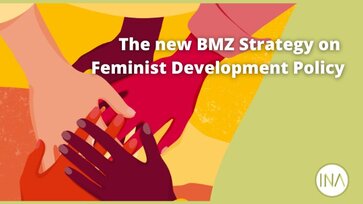New BMZ Strategy on Feminist Development Policy
An article by Julia Bayer-Cremer and Kim Hillenbrand
On 1 March, the BMZ announced its new strategy for a feminist development policy (FEP). The aim of the new FEP is to dismantle discriminatory structures - for women and girls as well as marginalised groups. The focus is on gender justice.
To achieve this goal, the BMZ wants to increasingly implement gender-transformative and intersectional approaches. This means overcoming structural and systemic causes of the lack of justice and paying attention to the intersection of different grounds of discrimination. Only in this way can all people participate equally and in a self-determined manner in social, political and economic life.
The new orientation of the BMZ's feminist development policy aims to reduce gender-based injustices and discrimination by focusing on the "3 Rs" - rights, resources and representation. Rights of women and marginalised groups are to be strengthened, their access to resources improved and their representation strengthened as the key to equal participation.

The rights of women and marginalised groups are to be strengthened to ensure that they can participate equally in social, political and economic life. This includes, for example, strengthening women's rights, combating gender-based violence and discrimination, and protecting women and girls from exploitation and abuse.

Furthermore, the access of women and marginalised groups to resources such as land, credit, education, health care and vocational training should be improved. Equality in the distribution of resources can help reduce economic and social inequalities and thus improve the quality of life of women and marginalised groups.

Finally, the representation of women and marginalised groups should be strengthened by promoting their participation in decision-making processes and political structures. Strong representation is crucial to ensure that the needs and interests of women and marginalised groups are adequately addressed. This can be achieved, for example, by promoting women in political positions, strengthening women's organisations and involving women in decision-making processes at local and national levels.
By changing unjust power structures along these "3 Rs", women and marginalised groups can be empowered and given equal opportunities and rights to shape their own futures.
To achieve the 3Rs, the BMZ has set itself the goal of increasing the share of its newly committed project funds for the promotion of gender equality to 93 percent by 2025. This means that a large part of the financial support for development projects is to be used specifically for measures aimed at eliminating gender inequalities and promoting gender-equitable development.
In international cooperation forums such as the UN, the World Bank or the EU, the BMZ will specifically put gender equality on the agenda. The BMZ is also committed to ensuring that other countries and organisations around the world take feminist approaches into account in their development policies. This feminist approach is also to be exemplified within the organisation itself. One example of this is the appointment of women to 50% of management positions in the ministry.
Gender justice is the focus of our work at INA. This is the only way to improve the living and working conditions of all people at the beginning of agricultural supply chains. Therefore, gender-just agricultural innovations and the understanding of gender-specific differences are at the centre of fair agricultural systems - unjust power structures are to be changed.
